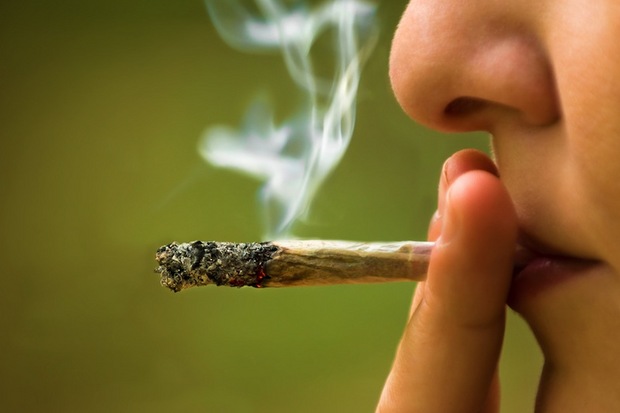Pot Smokers Show Less Inflammation

People who smoke marijuana may have lower levels of inflammation compared with people who have never smoked it, according to new research on one marker of inflammation.
In the study, researchers examined data from more than 9,000 people on their history of marijuana use and their levels of C-reactive protein (CRP), one marker of inflammation that is frequently linked with people's risk of heart disease.
About 40 percent of the people in the study said they had never smoked marijuana, while 48 percent reported having smoked the drug at least once in their lifetimes, but not in the past 30 days. About 12 percent (1115) said they smoked marijuana recently, or at least once in the past 30 days. The researchers found that the people who smoked in the last month had lower CRP levels than those who had never smoked the drug.
The new evidence "points toward possible anti-inflammatory effects of cannabis smoking," the authors wrote in the study, published online Nov. 28 in the journal Drug and Alcohol Dependence.
However, the researchers remain cautious about the possible implications of their findings, as previous research on CRP levels and marijuana use in people has been scarce and the results of other studies have been inconsistent. [11 Odd Facts About Marijuana]
"Replication studies always are very important, and no firm conclusions can be drawn until evidence starts to converge," study author Omayma Alshaarawy, a postdoctoral researcher in epidemiology at Michigan State University, told Live Science.
The new study was based on data gathered from people ages 20 to 59 from the National Health and Nutrition Examination Survey (NHANES) that was collected between 2005 and 2010.
Get the world’s most fascinating discoveries delivered straight to your inbox.
The findings come after a previous study of about 8,000 people, also ages 20 to 59, which yielded more-mixed results. The previous study found — in line with the idea that marijuana may lower inflammation — that people who had smoked marijuana in the past had lower average CRP levels than those who had never used the drug. It also found that former and current marijuana smokers were less likely to have CRP levels that would be considered "elevated" than people who had never used the drug.
However, another finding from that same study cast doubt on the notion that pot lowers inflammation, because current marijuana smokers did not have lower CRP levels than those who had never used the drug. The findings were based on NHANES data collected between 1988 and 1994, and published in 2012 in the journal BMJ Open.
And in another study of 1,420 young people (whose average age was 14), published in 2013 in the journal Drug and Alcohol Dependence, researchers found that marijuana use was actually linked to higher CRP levels.
That study, however, "was based on a relatively small sample in the Great Smoky Mountains, with relatively large margins of error," Alshaarawy said.
In contrast, the new study "is based on quite large national samples with much smaller margins of error," she said. "But there still is reason to postpone drawing firm conclusions until more research has been completed."
The difference in the results of the new study and the study of the young people may have something to do with differences in the participants' ages, said Émilie Jouanjus, a faculty member and marijuana researcher at the Toulouse University Hospital in France, who was not involved in any of the CRP studies.
Jouanjus called the new study "interesting," saying that it adds to scientific knowledge in the field of marijuana use.
The mechanism that might underlie a link between lower CRP levels and smoking marijuana is not clear. However, based on previous research, Alshaarawy and her colleagues speculated that marijuana's activation of cannabinoid-2 receptors could mediate the drug's potential anti-inflammatory effects.
It also remains unknown how the drug may influence people's risk of heart disease, which has long been linked with elevated CRP levels.
"CRP is a marker of inflammation and thus constitutes a cardiovascular risk factor," Jouanjus said."This implies that lower CRP levels should [theoretically] be linked to a lower risk of heart problems."
At the same time, some reports have linked heart problems, including fatal problems, to marijuana use, particularly among young people.
"Indeed, the cardiovascular complications reported in the scientific literature mainly concern young marijuana users with apparently no cardiovascular risk factor," Jouanjus said.
In a September 2014 interview with Live Science, Dr. Sripal Bangalore, an associate professor and interventional cardiologist at the Department of Medicine of NYU Langone Medical Center, used term "the pot heart" to describe this phenomenon.
However, the reports that link marijuana use with heart problems "offer little more than anecdotal evidence at this point," Alshaarawy said.
Jouanjus offered a possible explanation of this seemingly conflicting information on marijuana's potential effects on health. She said there is indeed evidence that compounds in marijuana have anti-inflammatory properties that are mediated by the activation of type 2 cannabinoid receptors. However, the compounds also target other receptors and activate pathways that may play a role in triggering cardiovascular diseases, she said.
Follow Agata Blaszczak-Boxe on Twitter. Follow Live Science @livescience, Facebook & Google+. Originally published on Live Science.
